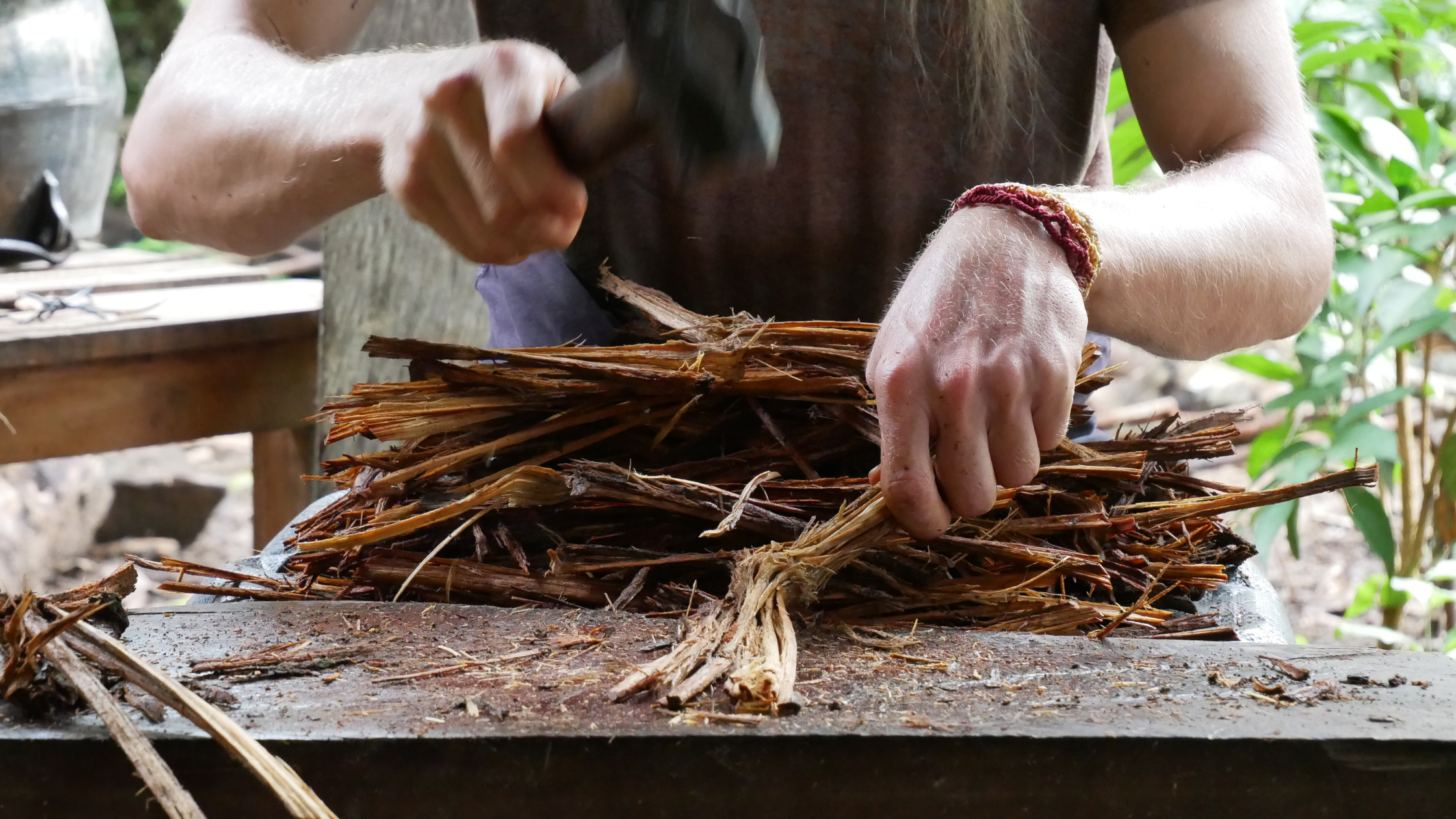This medicine is a traditional plant medicine that has been used for centuries by indigenous communities in the Amazon Basin, particularly in countries like Peru, Colombia, Brazil, and Ecuador. As interest in traditional plant medicines grows worldwide, many people are curious about what it is and how it might benefit them.
What is this Medicine?
It is a ceremonial brew traditionally made from two main plants:
- Banisteriopsis caapi vine – Contains MAO inhibitors called beta-carbolines (harmine, harmaline, and tetrahydroharmine)
- Psychotria viridis leaves (or other DMT-containing plants) – Contains N,N-Dimethyltryptamine (DMT), the primary psychoactive compound
When combined, these plants create a unique synergy. The MAO inhibitors from the vine prevent the breakdown of DMT in the digestive system, allowing it to reach the bloodstream and cross the blood-brain barrier, producing profound altered states of consciousness that typically last 4-6 hours.
In indigenous Amazonian traditions, it is considered a sacred medicine and is used under the guidance of experienced shamans in ceremonial contexts for healing, spiritual connection, and divination.
How Might this Medicine Help?
Research into it’s therapeutic potential has grown significantly in recent years. Here are some of the ways it may potentially benefit those who participate in ceremonies:
Psychological Well-being
- Depression and Anxiety: Several studies have shown promising results for treatment-resistant depression and anxiety disorders. Research published in Psychological Medicine found significant reductions in depression scores following sacred ceremonies that persisted for weeks after a single session (Palhano-Fontes et al., 2019).
- PTSD and Trauma Resolution: The visionary and introspective nature of the medicine experience may help individuals process traumatic memories in a new context, potentially reducing their emotional charge (Inserra, 2018).
- Addiction Recovery: Research has indicated potential benefits for substance use disorders. A study in Current Neuropharmacology found the medicine may help reduce problematic substance use, possibly by increasing mindfulness and addressing underlying trauma (Dos Santos et al., 2016). Our optional Grandfather Root Medicine ceremony is particularly helpful in addiction recovery.
Spiritual and Personal Development
- Increased Self-awareness: Many participants report profound insights into personal patterns, behavior, and unconscious material.
- Spiritual Connection: The experience often includes feelings of interconnectedness, transcendence, and access to what many describe as deeper spiritual dimensions. Many experience a direct connect to source, their higher self, spirit guides and loved ones who have passed.
- Renewed Purpose: Some participants report clarity about their life direction and renewed sense of meaning following such experiences. It is very common for people to ask during ceremony, “What is my life purpose?” and then, receive the answer.
Physical Well-being
While less studied scientifically, traditional use includes treating various physical ailments. Some participants report improvements in chronic conditions, though more research is needed in this area.
Will this Help Me?
It’s essential to understand that sacred ceremony is not a magic cure-all, but rather a tool that, when used respectfully and in the proper context, may catalyze healing processes. Based on a growing pool of research, here are reported effects on individuals:
Immediate Effects:
- Visual and auditory alterations (geometric patterns, visions)
- Intense emotional experiences
- Physical purging (vomiting, diarrhea) – often viewed as cleansing
- Altered perception of time and space
- Enhanced introspection
Longer-Term Claims:
- Psychological insights and personal revelations
- Reduced symptoms of depression and anxiety
- Increased mindfulness and present-moment awareness
- Enhanced connection to nature or spirituality
- Changed relationship with addictive substances
- Greater sense of meaning and purpose
- Resolved emotional trauma
Community and Cultural Aspects:
- Sense of connection with others and shared healing
- Appreciation for indigenous knowledge and traditions
- Integration of experiences into ongoing personal growth
It’s worth noting that peoples’ experiences vary widely, and the ceremonial context, personal intentions, and cultural framework significantly influence outcomes. Research continues to explore both the subjective experiences and measurable effects of the medicine use in various contexts. Here are some important things to take into consideration about whether or not this is right for you:
- Integration is Key: The insights gained during ceremonies require integration into daily life to create lasting change.
- Medical Contraindications: This experience is not appropriate for everyone, particularly those with certain medical conditions like diabetes or heart issues or taking medications that interact with MAOIs such as SSRIs, SNRIs, antidepressants, anti-psychotics.
- Psychological Readiness: The experience can be intense and challenging, requiring psychological preparation and proper support which we begin through pre-adventure journaling.
- Ethical Framework: Choosing facilitators who operate with integrity, proper training, and respect for indigenous traditions is essential.
The Science Behind the Medicine
Recent scientific research has begun to shed light on how this affects the brain and body:
- Brain Activity: Neuroimaging studies show activity in brain regions involved in emotion, memory, and introspection, particularly the default mode network (Palhano-Fontes et al., 2015).
- Anti-inflammatory Properties: Some research suggests the beta-carbolines in the medicine have anti-inflammatory and neuroprotective properties (Frecska et al., 2016).
- Neuroplasticity: Studies indicate it may promote neural plasticity, potentially helping create new neural pathways that support behavioral change (Morales-García et al., 2017).
This is a powerful traditional plant medicine with growing scientific evidence for various therapeutic applications. When approached with respect, proper preparation, and in a safe ceremonial context, it may offer profound benefits for psychological well-being, personal growth, and spiritual connection.
However, this ancient medicine demands respect and is not suitable for everyone. Those interested should thoroughly research, consult healthcare providers about potential contraindications, and come with us to work with experienced facilitators with established safety protocols, years of experience, integrity and concern for your safely and highest good.
Safety Note:
Before considering a sacred ceremony, please note: This medicine contains MAO inhibitors that can cause potentially life-threatening reactions when combined with many common medications, including antidepressants (SSRIs, SNRIs, tricyclics), stimulants, antipsychotics, and certain pain medications. Most require medical supervision to taper off and a 2-6 week washout period before it’s safe to participate. Always consult with healthcare providers and never discontinue prescribed medications without proper medical guidance.
Does this resonate with you? Interested in joining us? Want more information? Click here for all the details
References
- Palhano-Fontes, F., Barreto, D., Onias, H., et al. (2019). Rapid antidepressant effects of the psychedelic ayahuasca in treatment-resistant depression: A randomized placebo-controlled trial. Psychological Medicine, 49(4), 655-663.
- Inserra, A. (2018). Hypothesis: The psychedelic ayahuasca heals traumatic memories via a sigma 1 receptor-mediated epigenetic-mnemonic process. Frontiers in Pharmacology, 9, 330.
- Dos Santos, R. G., Osório, F. L., Crippa, J. A., & Hallak, J. E. (2016). Antidepressive and anxiolytic effects of ayahuasca: A systematic literature review of animal and human studies. Revista Brasileira de Psiquiatria, 38(1), 65-72.
- Palhano-Fontes, F., Andrade, K. C., Tofoli, L. F., et al. (2015). The psychedelic state induced by ayahuasca modulates the activity and connectivity of the default mode network. PLoS ONE, 10(2), e0118143.
- Frecska, E., Bokor, P., & Winkelman, M. (2016). The therapeutic potentials of ayahuasca: Possible effects against various diseases of civilization. Frontiers in Pharmacology, 7, 35.
- Morales-García, J. A., de la Fuente Revenga, M., Alonso-Gil, S., et al. (2017). The alkaloids of Banisteriopsis caapi, the plant source of the Amazonian hallucinogen ayahuasca, stimulate adult neurogenesis in vitro. Scientific Reports, 7(1), 5309.



